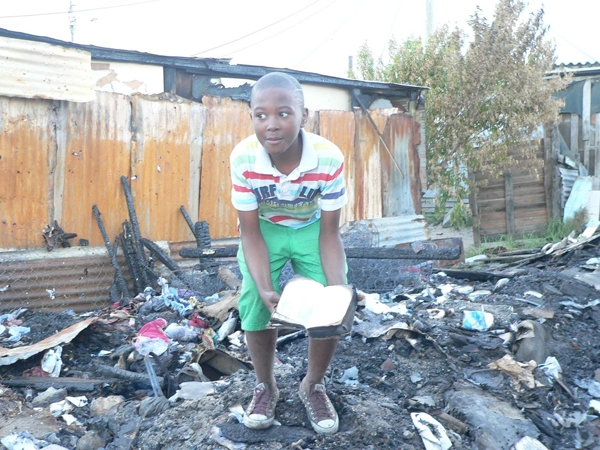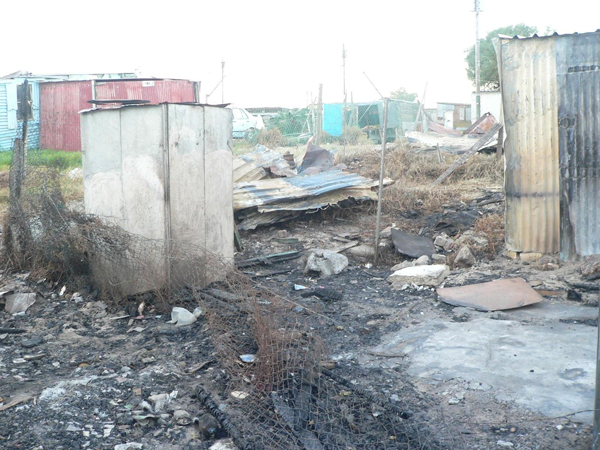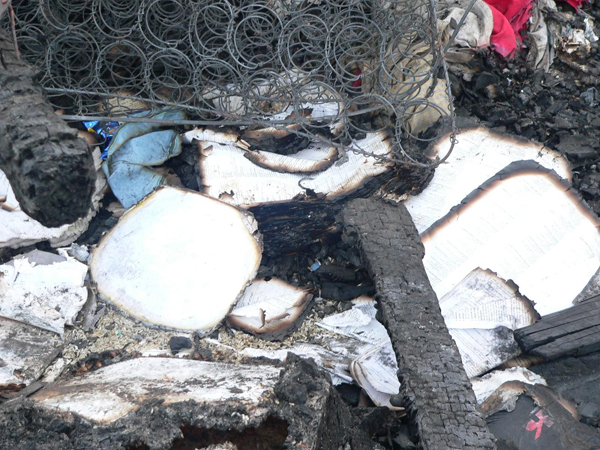

Sibulele Swapi lost all his books in this shack fire. Photo by Pharie Sefali.
5 December 2014
With summer heat and seasonal gale force southeaster winds, it is a time of high risk for shack fires. There were 123 fires in the past month in informal settlements in the Western Cape. This December, load shedding may well be adding to that risk. GroundUp visited a family in the aftermath of a recent shack fire to see how they are coping.
In a fire on the weekend of 29 November in Barcelona, Gugulethu, Sindiswa Swapi lost everything.
At about 4:30pm, Swapi said she was woken by three of her neighbors, shouting to her to open her door.
“I took my children out of the shack to safety and ran to see what was happening. I saw people throwing water at my neighbor’s house and trying to kick a door open. By the time the door was opened, half of the house was burnt, affecting other houses,” said Swapi.
A lady known as Nomampondo said that some people in the community believe the cause of the fire was a stove that was left switched on.
“We think that the owner of the shack where the fire started left his stove switched on or did not realize that the stove was on because there was load shedding in the area … [Shortly] after the electricity came back on, the fire started.”

One of the seven shacks that went up in flames at Barcelona, Gugulethu. Photo by Pharie Sefali.
“We do not blame Eskom, but I think that Eskom should give us notices about times of load shedding, because sometimes when the electricity just goes off, we get upset and forget about safety precautions,” said Nomampondo.
Eskom does give notice of planned power cuts, but as GroundUp previously reported, some communities struggle to get the information.
Nomampondo says that the owner of the shack ran away after what happened and they haven’t seen him since.
According to Wilfred Solomons-Johannes, acting head of the Disaster Operations Centre in the Western Cape, faulty electrical equipment was the suspected cause of the Barcelona fire.
Solomons-Johannes said the City’s disaster response team assisted the fire victims with food parcels, clothing, blankets, toiletries and building materials.
Seven shacks were destroyed by the fire and 28 people left homeless.
Swapi, her three children and husband are now staying in a neighbour’s one-bedroomed shack.
“My neighbour offered my family a place to stay even though she and her family of four are already staying in the shack. My family and I are sleeping on the floor. We eat food parcels that were given to us by disaster management.”
“I am hurt because I not only lost everything, but my two two-week old puppies were burnt to death and we couldn’t help them,” says Swapi.
Her surviving dogs and puppies are now homeless.
Swapi said that she doesn’t have anything to wear; her children’s school books were burnt, including their school uniforms, clothes and birth certificates. She feels helpless; she had just bought her children summer clothes for the December holiday before the fire destroyed everything.

All that remains of the neighbour’s house where the fire started. Photo by Pharie Sefali.
“My husband is the only one working at home … He doesn’t know how we are going to survive for the month because we have to buy beds and other furniture and still have to think of the children’s school uniforms for next year amongst other things,” says Swapi.
Sibulele Swapi, who is 13 and in grade six, says he is glad that none of his family members were burnt, but he is sad he is not going to enjoy his holiday like other children; there won’t be any money to buy Christmas goodies.
Other families are also staying at their neighbours until they rebuild.
Charlotte Powell, portfolio Head of Public Awareness and Preparedness at the Disaster Risk Management Centre, says the fire season is normally the summer months ranging from early October to late March every year.
“This is a high risk time when the southeaster blows at gale force strength and temperatures are high. Once uncontrolled fire is started, the combination of strong winds and dry vegetation makes it extremely difficult to control, especially in mountainous areas where access is difficult”, says Powell.
According to fire and rescue services in the Western Cape, between 1 November and 2 December, 2216 fire responses were recorded of which 397 were structures on fire; 123 of those were in informal settlements with nine fatalities and 406 informal dwelling units burned down.
According to Ian Schnetler Chief Fire Officer, the shack fires (123) and fatality (nine) figures for this year and last year were exactly the same, but 81 less homes were destroyed.